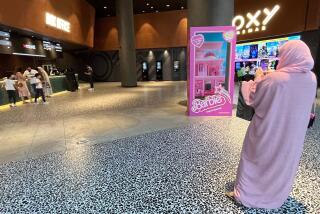UAE bans Pixar’s ‘Lightyear’ because film includes a same-sex kiss

- Share via
DUBAI, United Arab Emirates — The United Arab Emirates on Monday banned the upcoming Pixar animated feature “Lightyear” from showing in movie theaters because of its inclusion of a kiss between two lesbian characters.
Malaysia also reportedly will ban the film. The UAE ban raises the possibility that other Muslim-majority nations could follow suit on what is expected to be one of Disney’s biggest animated films of the year as the film industry comes out of the depths of the coronavirus pandemic.
The Emirates, home to Abu Dhabi and Dubai, announced through its Media Regulatory Office of the country’s Ministry of Youth and Culture that “Lightyear” would not be opening in the country on Thursday.
The film “is not licensed for public screening in all cinemas in the UAE, due to its violation of the country’s media content standards,” the office said in a tweet. “The office confirms that all films screened in cinemas across the country are subject to follow-up and evaluation before the date of screening to the public, to ensure the safety of the circulated content according to the appropriate age classification.”
Saudi Arabia has banned ‘Doctor Strange in the Multiverse of Madness’ from theatrical release in the country due to its inclusion of a lesbian superhero.
The office did not elaborate on the tweet and did not immediately respond to questions from the Associated Press. The tweet included an image of the film’s poster, with the profile image of its main character, Buzz Lightyear, with a “no” symbol over it in red.
Movie theaters in the UAE, a federation of seven sheikhdoms on the Arabian Peninsula, had already advertised showtimes for the film. But over the weekend, a social media campaign with the Arabic hashtag “Ban Showing Lightyear in the Emirates” caught the attention of conservative Emiratis. They described showing a lesbian couple onscreen as being against their culture and religion.
The movie, with actor Chris Evans voicing the inspiration for the Buzz Lightyear action figure from the “Toy Story” films, includes a female character voiced by actress Uzo Aduba kissing her female partner.
The UAE, like many other countries in the wider Mideast, is a Muslim-led nation that criminalizes same-sex relationships. The U.S. State Department warns that Islamic, or Shariah, law in the UAE can include the death penalty for same-sex conduct, while Dubai can levy a 10-year prison sentence and Abu Dhabi allows for up to 14 years.
Like Netflix with Dave Chappelle or Warner Bros. with J.K. Rowling, Disney has shown that its rainbow logos and statements of support are lip service.
However, such prosecutions are rarely reported and LGBTQ individuals do live in the skyscraper-studded city-state of Dubai.
The $200 million “Lightyear” is expected to be a major draw for Disney, with analysts estimating it could gross more than $100 million in its first weekend.
Studios have allowed censors to cut films in global distribution for content in the past, including in the Mideast market. Recently, Disney has faced protests from activists and its own staff over what they described as CEO Bob Chapek’s slow response in publicly criticizing Florida legislation that opponents dubbed the “Don’t Say Gay” bill.
Florida Gov. Ron DeSantis in late March signed the bill, which forbids instruction on sexual orientation and gender identity in kindergarten through third grade.
The kiss had been earlier cut from the film but was restored after Pixar employees protested Disney’s response to Florida’s bill.
Now Florida Gov. DeSantis wants to strip medical care from transgender children and adults.
The movie also may be banned in Malaysia. The Star, the country’s top English-language newspaper, cited an anonymous, nongovernment source as saying that “Lightyear” will not be shown in Malaysian cinemas. No reasons were given. A newspaper in the Persian Gulf island kingdom of Bahrain similarly has speculated the film wouldn’t be shown there.
Officials from Malaysia’s Film Censorship Board and the Home Affairs Ministry, as well as the Walt Disney Co., could not be immediately reached for comment.
More to Read
Only good movies
Get the Indie Focus newsletter, Mark Olsen's weekly guide to the world of cinema.
You may occasionally receive promotional content from the Los Angeles Times.













